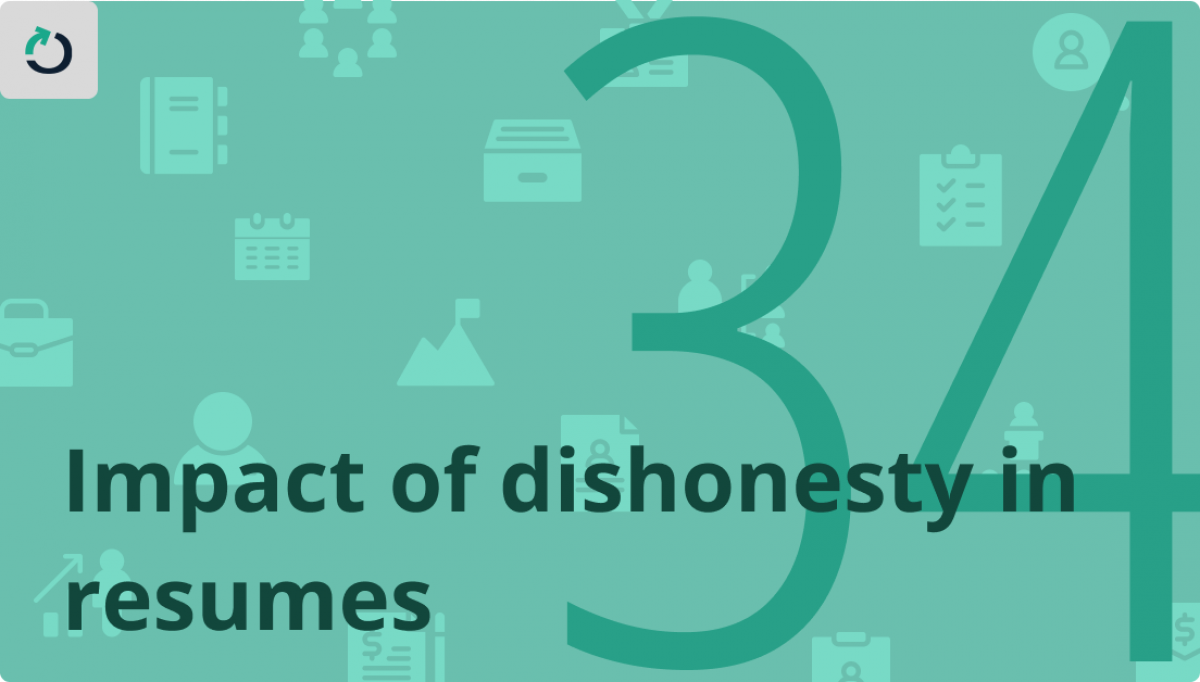The use of dishonesty in resumes by job candidates has been a growing concern in the corporate world. Candidates may cheat by exaggerating their accomplishments, lying about their qualifications or work experience, and even fabricating credentials. Such deceit can have a significant impact on the hiring companies, affecting not only their productivity but also their reputation. In this article, we will explore the consequences of candidates cheating in resumes for hiring companies.
One of the most significant effects of candidates cheating in resumes is the potential damage to the company's reputation. Hiring managers rely heavily on the information provided by candidates in their resumes to determine their suitability for a role. When a candidate is found to have lied or exaggerated on their resume, it can lead to a loss of trust in the hiring process and can damage the company's reputation. A study conducted by CareerBuilder found that 75% of employers have caught a lie on a resume, and 39% have decided not to hire a candidate based on that lie. This shows the negative impact that resume cheating can have on the company's image.
Furthermore, candidates who cheat on their resumes may not possess the necessary skills or qualifications for the job they have been hired for. This can lead to decreased productivity and poor performance on the job, which can have a direct impact on the company's bottom line. A study by The Society for Human Resource Management found that 43% of HR professionals reported that poor hires cost their organization thousands of dollars. In some cases, the cost can be even higher. A report by CareerBuilder estimated that a bad hire can cost a company up to $25,000 in lost productivity and other expenses.
In addition to the financial impact of a bad hire, companies may also face legal repercussions if they discover that an employee has lied on their resume. For example, if an employee is found to have lied about their education or credentials, it could lead to legal issues if they are involved in a project that requires certain qualifications. This can lead to a loss of trust from clients, partners, and shareholders, as well as legal consequences.
Moreover, resume cheating can also lead to workplace tensions and affect employee morale. When employees find out that a colleague has lied to get their job, it can lead to a sense of mistrust and resentment in the workplace. This can cause tension between employees and management, as well as a decrease in morale, which can negatively impact the overall workplace culture. A study by Robert Half found that 94% of workers believed that lying on a resume was not acceptable, indicating the importance of honesty in the workplace.
To combat the issue of candidates cheating in resumes, companies have started to take measures to verify the accuracy of the information provided by job applicants. Background checks, reference checks, and employment verification are becoming increasingly common in the hiring process. A study by HireRight found that 85% of employers conduct background checks on job candidates, up from 51% in 1996. This indicates that companies are taking the issue of resume cheating seriously and are taking steps to ensure that they are hiring honest and qualified candidates.
In conclusion, the impact of candidates cheating in resumes can be significant for hiring companies. It can lead to a loss of trust in the hiring process, damage to the company's reputation, decreased productivity, legal issues, and workplace tension. To mitigate these risks, companies must take steps to verify the accuracy of the information provided by job candidates. This includes conducting background checks, reference checks, skill assessments, and employment verification. Ultimately, companies must ensure that they are hiring honest and qualified candidates to avoid the negative impact of resume cheating.
How skill assessments can reduce the impact of cheating in resumes
Skills assessments have become an essential tool in the hiring process for many companies. By testing a candidate's skills and abilities, hiring managers can gain insight into the candidate's qualifications and determine whether they are a good fit for the job. Skills assessments also have the potential to reduce the impact of candidates cheating in resumes. In this article, we will explore how skills assessments can help reduce the impact of resume cheating and provide evidence from research articles to support our arguments.
One of the primary benefits of skills assessments is that they provide objective, measurable data on a candidate's abilities. Unlike resumes, which can be manipulated or exaggerated, skills assessments offer a more accurate representation of a candidate's qualifications. This is especially important when it comes to technical skills or specialized knowledge, where even small gaps in knowledge can have a significant impact on job performance. A study by SHL found that companies using skills assessments in their hiring process saw a 39% improvement in their quality of hire.
Furthermore, skills assessments can help identify discrepancies between a candidate's resume and their actual abilities. For example, a candidate may claim to have experience with a particular software program, but their skills assessment may reveal that they have only a basic understanding of the software. This can help prevent a bad hire and reduce the impact of resume cheating. A study by Aberdeen Group found that companies using skills assessments in their hiring process saw a 25% reduction in turnover rates.
In conclusion, skills assessment tools like Merreo can help reduce the impact of candidates cheating in resumes by providing objective, measurable data on a candidate's abilities. They can help identify discrepancies between a candidate's resume and their actual qualifications, reducing the risk of a bad hire. Skills assessments can also help to reduce unconscious bias in the hiring process, leading to more diverse and inclusive teams. By incorporating skills assessments into their hiring process, companies can ensure that they are hiring the most qualified candidates and reduce the negative impact of resume cheating.
References:
CareerBuilder. (2017). The Prevalence of Lies on Resumes. Retrieved from https://www.careerbuilder.com/advice/the-prevalence-of-lies-on-resumes
SHL. (2017). The Business Case for Skills Assessments. Retrieved from https://www.shl.com/wp-content/uploads/2018/02/Business-Case-for-Skills-Assessments.pdf
Aberdeen Group. (2014). Skills Assessments: A Strategic Weapon for Recruiting. Retrieved from https://www.accenture.com/t20151023T090646__w__/no-en/_acnmedia/Accenture/Conversion-Assets/DotCom/Documents/Global/PDF/Industries_5/Accenture-Skills-Assessment-Strategic-Weapon-for-Recruiting.pdf
Indeed. (2021). The impact of skills assessments on hiring diversity. Retrieved from https://www.indeed.com/hire/c/info/the-impact-of-skills-assessments-on-hiring-diversity





